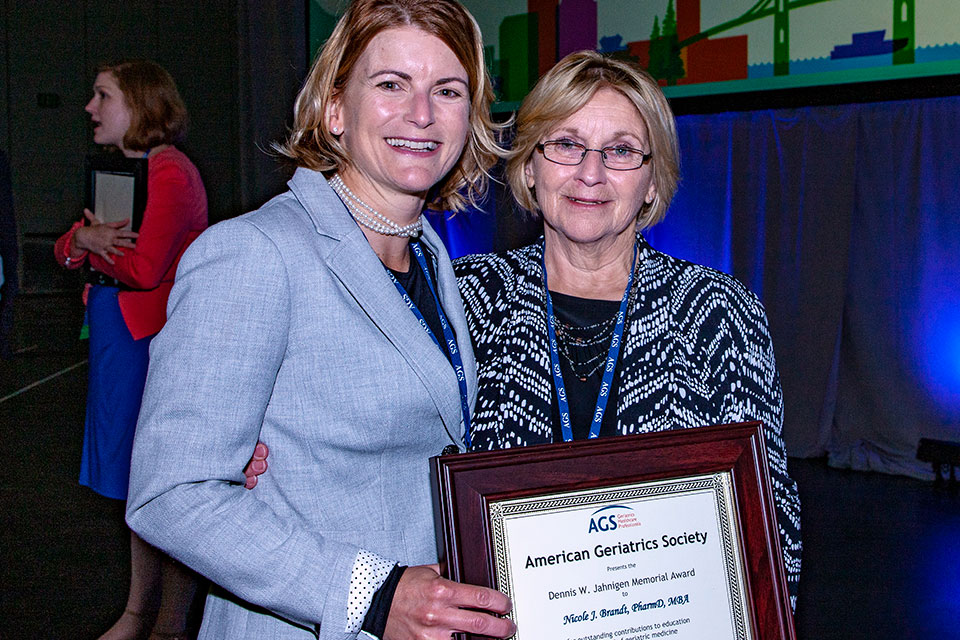SOP Faculty and Students Have a Presence at the Maryland General Assembly
Faculty and student pharmacists from the School of Pharmacy met with state delegates and senators throughout the session to advocate for pharmacy-related legislative issues.
By Sylvia A. Bolls
May 6, 2015
In an effort to bring awareness to Maryland’s elected officials about pharmacy education and the practice of pharmacy, faculty and students from the University of Maryland School of Pharmacy traveled to Annapolis throughout the 2015 legislative session to meet as groups and one-on-one with the state’s policy makers. From participating in the Maryland Pharmacy Coalition’s (MPC) annual Legislative Day to testifying before House and Senate committees on specific bills, the School of Pharmacy had a strong presence at the General Assembly throughout the 90-day session.
“Legislative advocacy is an important tradition at the School of Pharmacy,” says Deborah DeWitt, JD, assistant dean for policy and planning. “It’s important for our students to establish a culture of advocacy while they are in School and to see first-hand the influence they can have on state laws that have the potential to impact how they care for patients.”
“Most people think of pharmacists as that person behind the counter at their local drug store; however pharmacists practice in many other locations including nursing homes, assisted living facilities, hospitals, and clinics,” says Ryan Button, a second year student pharmacist. “Pharmacists counsel patients on medication use and provide medication management services for individuals and companies. With so many new legislators this year, we wanted to make sure they understand the scope of all that pharmacists can do.”
One of the School of Pharmacy’s first activities in which faculty and students took part was MPC’s annual Legislative Day on Feb. 19. The School joined faculty and students from the University of Maryland Eastern Shore School of Pharmacy and Notre Dame of Maryland University School of Pharmacy to talk with legislators about expanding the scope of a pharmacist’s practice to include authorization to administer any self-administered drugs for which a patient has a prescription and to expand the state’s collaborative practice law to include agreements between nurse practitioners and pharmacists.
House Bill (HB) 657, jointly sponsored by School of Pharmacy Board of Visitor Member and Delegate Joseline Pena-Melnyk of Prince George’s and Anne Arundel Counties and Delegate Susan Krebs from Carroll County, authorizes a pharmacist to administer self-administered drugs to a patient under specified circumstances in accordance with regulations developed by the Maryland Board of Pharmacy. “Self- administered drugs” include eye drops and drug(s) administered by intramuscular or subcutaneous injection. The bill, which passed the House and Senate, could help pharmacies expand their patient care services.
“Seniors commonly have either cognitive or dexterity concerns due to dementia, arthritis, Parkinson’s disease or other conditions making it difficult for them to administer their own medication appropriately,” says Nicole J. Brandt, PharmD, a professor of pharmacy practice and science who testified on behalf of HB 657. “Allowing pharmacists through this bill to administer or to train these patients and/or their caregivers in the administration of their medications would help improve medication adherence and patient safety by ensuring that medications are being taken correctly.”
Likewise, House Bill 716/SB 0347, which also passed, focuses on collaborative practice, expanding the list of health care providers with whom pharmacists can enter into a collaborative practice to include nurse practitioners. Through collaborative practice, a drug therapy management contract is established between a pharmacist, a prescriber, and a patient for a specific disease state. It gives the pharmacists the authority to adjust the patients’ medications without prior approval from the prescriber. Because of the patient’s easy access to his or her pharmacist and the pharmacist’s expertise in medications, the patient’s medications can be more easily managed and monitored through these arrangements.
“The current legislation requires a signed agreement between the physician, pharmacist, and patient,” says Bethany DiPaula, PharmD, an associate professor in pharmacy practice and science who has a collaborative practice agreement related to substance abuse disorders. “A major change under this legislation is the authority to initiate drug therapy. Previously, we were only permitted to modify or discontinue drug therapy. Moreover, our agreements would expire after one year, which placed an enormous administrative burden on the health care team. The new legislation would remove the expiration date from the contract, but still allow the patient to end participation at any time.” The drug therapy bills were sponsored by Delegate Pena Melnyk and Senator Catherine Pugh, who represents the district surrounding the School of Pharmacy.
“The state’s legislative session provides many opportunities for our student pharmacists to practice their advocacy skills and to learn early on the importance of advocating for our profession in collaboration with faculty, alumni, and our colleagues from the Maryland Pharmacy Coalition,” says Natalie D. Eddington, PhD, FAAPS, FCP, dean and professor of the School. “Each year, I am impressed by our students who educate themselves about important pharmacy-related issues, speak passionately and confidently about the issues, and who leave a strong impression on our officials. I also appreciate the time our faculty and School leadership commit to working with our students to prepare them for the legislative session and who themselves advocate for our profession.”



